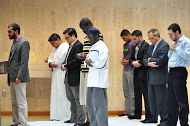Tebben Gill Lopez/The Mirror
Junior Sohail Sumra used to go to the back of his chemistry class in high school and begin reciting his daily prayers as a practicing Muslim.
“After the first couple of weeks people got used to it,” Sumra said. “My freshman year of high school, my teacher offered me his room to pray, and at Fairfield I have gotten the same response. You go to Campus Ministry and there are prayer rugs there.
“Luckily I’ve never had any real aversion,” Sumra added. “The majority of what I get is a lot of confusion and a lot of questions” about his religion.
Sumra recited the adhan, or call to prayer, during Friday’s Muslim Prayer service held in the interfaith room in 42 Bellarmine Road. He was one of eight Muslims that took part in the Friday prayer.
“I learned to recite the adhan as a child,” Sumra said. “It’s easy to pick up because you hear it five times a day,” referring to the five prayers Muslims recite each day.
With his dad as a hafiz, someone who has memorized the Quran, Islam has been a significant part of Sumra’s life. “Having it be such a part of my life was difficult in that there was more pressure on me to know what I was talking about, to know what I was doing as a hafiz’s son.”
In Islam, the Friday prayer is a weekly service, but on campus the service began four years ago with the help of the Muslim Student Association and it is held at least one Friday a month.
According to Dr. Martin Nguyen, assistant professor of religious studies, it is easier for Muslim students to attend the service when it is held on campus because otherwise they would need to go to a mosque off campus, with the closest being 15 minutes away in Bridgeport.
Anywhere from eight to 15 Muslims attend the prayer service on campus, and 12 to 30 people attend in all. “When there’s a greater demand, we might have something greater with the service,” Nguyen said.
Friday’s prayer continued with visiting Muslim Chaplain Jawad Bayat speaking of the Day of Ashura, when Prophet Muhammad’s grandson Husayn was killed in battle against the Umayyad who was in power.
Husayn’s death is an example of people standing up against injustice.
“The best fighting, struggle, in the path of God is to speak justice to an oppressive ruler,” Bayat said.
Considering students’ “strong work ethic” and their involvement on and off campus, Bayat hopes to use his one-year rotating position as chaplain to support students through their struggles in balancing academics with outside activities and organizations.
“I want to remind them that God doesn’t give us a burden we can’t handle, and we need to make the most out of our experiences,” Bayat said. “I’m happy to be here and I’m here to serve.”
According to Sumra, having a visiting chaplain can bring “new ideas and new energy, but it’s difficult to begin fresh every single year … and it would be beneficial to have an established full-time chaplain,” which would allow the chaplain to build more community on campus.
For students in the audience, the prayer service was different from what they were used to.
“Having attended Catholic masses my entire life, I found it refreshing to attend this prayer service and witness something new,” said Amanda Lajoie ’14. “I have always been fascinated by Muslim prayer… [and] the prayer service opened my eyes to the beauty of it.”
Senior Lauren Kavanagh found similarities in Christian and Muslim services, saying: “It was interesting to see how the sermon seemed to be very similar to sermons in Christian church services … [but] I also thought it was interesting how in different parts of the service, participants would pray together, then on their own.”


Leave a Reply